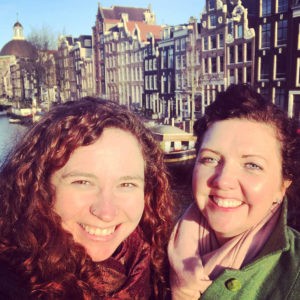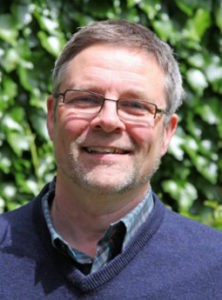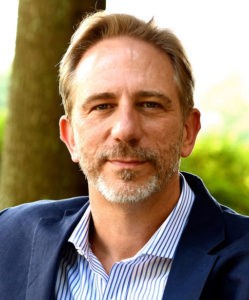While serving as a Baptist pastor in Kentucky, Erica Whitaker is working toward a Ph.D. at a prestigious European university.
Her academic pursuit, however, is more than a distance learning endeavor with a public research university in the Netherlands. Her studies are wed to a respected European Baptist institution and a well-regarded Baptist professor from the United States.
Whitaker studies at the Vrije Universiteit (Free University) Amsterdam. The VU collaborates with the International Baptist Theological Study Centre Amsterdam, a school founded as Baptist Theological Seminary in Rüschlikon, Switzerland, in 1949. Her major professor is Christian ethicist David Gushee, who has taught at Baptist-affiliated institutions in the U.S. for 28 years.

Erica Whitaker (right) in Amsterdam (pre-pandemic) as she began work toward a Ph.D. with the International Baptist Theological Study Centre under the Free University of Amsterdam. She posed here with a friend Tara who flew in from Scotland to meet her.
At IBTS, she engages with other Baptist research doctoral students from across Europe and around the world. IBTS doctoral students complete a year of study as a cohort and then are presented to the VU for admission. Throughout their program, IBTS students and faculty meet regularly in both online and in-person gatherings.
Whitaker, senior pastor at Buechel Park Baptist Church in Louisville since 2016, said the diversity of the IBTS helped draw her there for doctoral study.
“We are discovering new worlds of knowledge and experiences together,” said Whitaker, who entered IBTS in January 2020. The Holy Spirit, she noted, inspires mutual learning at IBTS “in the same way that a community of believers of the church and ecclesial community would do together.”
Gushee agreed the global perspective at IBTS is a rich environment for learning. He was appointed chair of Christian social ethics at the VU in March, becoming the first scholar to hold both a regular faculty appointment at the VU and an affiliation with IBTS.
“I think it will be good for me to get a new angle or vision on questions I have been dealing with in the U.S. setting for almost 30 years,” he said. “I think my writing, my speaking and my teaching perspective on these issues is going to be enriched. It is already being enriched.”
Gushee’s hiring fills a need for expertise in Christian social ethics at both the VU and IBTS, said IBTS Director Mike Pears. The journey to his hiring began when Gushee met with Pears for a meal while Gushee was traveling through Amsterdam.

Mike Pears
“One of the things that came out of that was David’s interest in supervising doctoral students,” said Pears, an ordained British Baptist minister. “And by that time, we’d been advised by the VU that a good step for us as an institution would be to gain a chair at the university. So, we just joined the dots together.”
Once Gushee was recommended by IBTS, a year-long personnel process ensued. His hiring by the VU permits him to be a major professor for students seeking doctorates through the school. IBTS students pursuing doctorates must have a VU professor as their lead professor and an IBTS professor as a secondary professor.
In addition to Whitaker, Gushee’s initial supervisees include a student from Wales and another from Brazil. He also continues to teach undergraduates at Mercer University, where he has been a faculty member since 2007.
Pears said Gushee’s appointment will reinvigorate the study of Christian ethics at IBTS. He explained the discipline at the school has been influenced heavily through its relationship with Glen Stassen and James McClendon, two Baptist scholars from the United States who are now deceased. Parush Parushev, a former student of both Stassen and McClendon, served in key academic leadership roles at IBTS, but he has retired from his full-time position at the school. He continues at IBTS as a senior research fellow.

David Gushee
Gushee co-authored with Stassen a 2003 book titled Kingdom Ethics, a work Gushee has described as “career making” in his trajectory as a Christian ethicist. A second edition of the book was published in 2016.
In Christian ethics classes in the United Kingdom and Western Europe, Gushee’s books are widely used as core texts, Pears said. Yet Gushee said his conversations with academicians across Europe have revealed course offerings in Christian ethics are not as plentiful as they would like. He hopes graduates of the VU will help fill this need.
“My hope is to muscle up the study of ethics and the competency in ethics all around the world, beginning in Europe,” he said. He estimated he might supervise as many as 50 doctoral students before he retires.
Most students at IBTS are involved in full-time careers in parish ministry, teaching or nonprofit leadership. While students completing the VU/IBTS doctoral program are qualified to teach in colleges, universities and seminaries, Gushee said not all will serve at academic institutions.
Study at IBTS is “sharpening the credentials” of people who are already serving in full-time ministry, Gushee said. Yet, unlike the doctor of ministry degree, the professional doctorate many full-time pastors pursue, the doctorate at IBTS is a research degree.
Whether she remains a parish minister or moves to a classroom vocation, Whitaker said her studies at IBTS will be helpful.
“Pastoring and teaching are one in the same for me,” Whitaker said. “Guiding congregations into a new kind of future as informed followers of Christ is very critical to my understanding of being the body of Christ in the world today.”
At the VU, like at other European universities, doctoral students work one-on-one with a professor who guides their study through the dissertation. In contrast to the U.S. system, there is no coursework on the doctoral level.
At the VU, like at other European universities, doctoral students work one-on-one with a professor who guides their study through the dissertation.
“I’m really impressed with the paradigm for doctoral research they are doing there,” Gushee said.
The school now known as IBTS was founded 72 years ago by the Southern Baptist Foreign (now International) Mission Board. While in Switzerland, alleged liberalism at the school became an issue in the Southern Baptist Convention in the early 1990s — part of the larger schism within the SBC that began in 1979 — and the SBC mission board withdrew a large portion of the funding it provided.
That decision outraged many moderate Southern Baptists, who came to the aid of the school. It was one of the first causes championed by the Cooperative Baptist Fellowship — a group of non-fundamentalist Baptists who broke away from the SBC — and today IBTS students remain eligible for CBF scholarship aid.
IBTS is governed by a board with representatives from member unions of the European Baptist Federation, and mission leaders of CBF and the American Baptist Churches in the USA also hold seats on the board.
The school moved from Rüschlikon to Prague in 1997 and then to Amsterdam in 2014. Economic factors and an evolving mission contributed to both moves, Pears said. Expanding opportunities at seminaries across Europe prompted IBTS to drop its master’s degree and focus on doctoral studies after it moved to Amsterdam.
In addition to doctoral studies, IBTS facilitates learning networks for students who lack formal theological education. IBTS develops this coursework in conversation with Baptist leaders from across Europe, Central Asia and the Middle East. Seminary-trained pastors in these regions adapt and teach the courses to suit local contexts.

Matt Norman
Matt Norman, a CBF field personnel in Spain, said the growing immigrant population in Europe has created a need for such courses. Many immigrant pastors have had few opportunities for theological studies.
“The Protestant church is surviving in Europe because of immigration from other parts of the world,” said Norman, who serves alongside his wife, Michelle. While Eastern European churches are mostly comprised of people who are European by lineage, he said Western European congregations tend to be populated with more immigrants than native Europeans.
Norman is developing a missional leadership course for the learning networks, and he also is working on a Ph.D. at IBTS. The learning network courses are not accredited, but Pears said they are “accreditation friendly” and may be accepted by colleges as transfer credit.
Amid the changing nature of the church in Europe, Pears said IBTS strives to be a “research community” that brings together a diverse company of scholars. IBTS’s preparation of theological educators to serve in Europe is critical for the future of European Baptists, he stressed.
Without theological education, Baptists will lose “the practice of theological reflection that enables people to negotiate through the world in ways that are thoughtful, wise and godly,” Pears said. “So, I think for me theological education is mission. It undergirds mission.”
Related articles:
IBTS trustees propose move to Amsterdam
Indivisible or individual? Where do Americans Christians pledge their allegiance? | Opinion by Erica Whitaker


